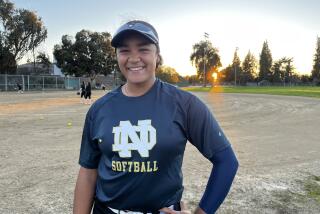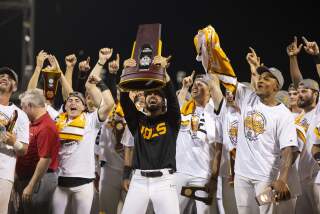Cochell Has Been Putting Down Roots in Omaha
- Share via
OMAHA — Home, at various points during Larry Cochell’s life, has been Lebanon, Ore., Arizona State, Utah State, Emporia State, Creighton University, Cal State Los Angeles, Oral Roberts, Northwestern, Cal State Fullerton and, for the moment, the University of Oklahoma.
They are bus stops on the road to 878 college baseball victories, off ramps in a career seemingly devoted to coaching as many good 19-year-old players within as many area codes as possible.
“Ron Polk, the baseball coach at Mississippi State, introduced me last year as ‘the Larry Brown of college baseball,’ ” Cochell says with a laugh. “He’s the one who hung that on me. He said, ‘Larry, I’ve got something I want to mail you. Is it the same address or should I forward it someplace else?’ ”
Cochell spent two years at Creighton, one at Northwestern. His three-year stay at Fullerton, from 1988 to 1990, was a virtual entrenchment by his standards.
They were good years, too. A trip to the College World Series in 1988. A trip to the College World Series in 1990. There was nothing trivial about his 109-68 record as a Titan, but now he is remembered in Orange County primarily as the answer to a barside trivia question:
Who coached baseball at Cal State Fullerton before and after Augie Garrido?
Cochell succeeded Garrido, and he preceded him. It only sounds confusing until you consider the reason it happened--Garrido being the first and only coach to leave Fullerton with his faculties intact and then decide, three years later, he wanted to come back.
Cochell was the intermission in the Garrido era at Fullerton. He was the substitute instructor while Garrido took a sabbatical in Champaign, Ill. Cochell inherited a nationally ranked program from Garrido and returned it to him in precisely the same condition.
This was one time when Cochell moved on and got the cleaning deposit back.
So what’s it like, pinch-hitting for a dynasty?
Not as easy as it looks, Cochell would want to tell you.
“He was so visible,” Cochell says of Garrido. “He’d won two national championships there, he took the program from nothing and put it on the map.
“Anytime you replace a coach who’s had that much success, you have to feel some pressure, I guess. But the administration at Fullerton felt even more pressure than I did. They were thinking, ‘We can’t let this guy fail. We’ve got to make sure he gets it done.’ ”
Cochell got it done. And what did it get him?
His 1988 team went 43-18 and finished third at Omaha, but the accompanying disclaimer was, “He did it with Augie’s players.”
His 1989 team went 30-27 and failed to make the NCAA playoffs, and the cry went up: “He’s ruined Augie’s program.”
His 1990 team went 36-23 but lost both games in the World Series, lending his hand to another verse: “Augie never would have lost to The Citadel , for God’s sake.”
Once again, Cochell found himself at a crossroads. Personally, he regarded 1990 as a breakthrough season. “I felt I’d earned my wings then,” he says. “Augie’s players were gone by then. I proved, at least to myself, that I could do it on my own.”
But Cochell’s vantage point was an athletic department that considered mere in-and-outs at Omaha below standard. And, usually, whenever confronted by a crossroads, Cochell heads straight for the exit sign.
So when Oklahoma and its last-place baseball program came calling and offering a five-year rollover contract at $100,000 per, Cochell’s wanderlust kicked in once more.
“Financial security,” is how Cochell understates it. “I was given the opportunity to set my family up for life.”
Oklahoma didn’t expect much from Cochell right away. “We see no reason why baseball in the spring can’t be what football and basketball are in the fall,” Oklahoma Athletic Director Donnie Duncan said after the hiring.
Four games a year--that’s all Cochell needed to win.
Just make sure all of them are against Oklahoma State.
“The short-term goal, the long-term goal, every goal they put out there was ‘Beat OSU,’ ” says Vern Ruhle, the pitching coach who followed Cochell from Fullerton to Norman. “It seemed like nothing else was the focus.”
Once pulses leveled out, Cochell gently expanded the vision. Yes, there is life beyond Oklahoma State. Cochell told the townsfolk of a land far, far, away, where brooks babble and children run free, where a nine-day baseball tournament is celebrated and given nearly the same significance as the annual Red-White spring football intrasquad game.
Come to Omaha, Cochell said.
Join him.
Within two years, the Sooners decided to follow.
Oklahoma qualified for its first College World Series berth since 1976 by winning the Big Eight championship and the Mideast Regional, toting an overall record of 42-22.
Best of all, Oklahoma played Oklahoma State seven times along the way.
Series standings: OU 4, OSU 3.
“We envisioned a longer timetable,” Duncan admits, “but Larry is optimistic and doesn’t hesitate. When he gets a guy on first, he’s usually going to send him to second.”
Now all the Sooners have to do is beat the throw. The mind may be willing, but the rebuilt body is still wobbling on new legs, as evidenced by Oklahoma’s 15-3 loss to Texas in Saturday night’s first-round game.
One more defeat and the Sooners are done, so the tour could be over by Monday. Not to worry, claims the tour guide. “This is going to whet their appetite,” Cochell says. “Recruiting should get a little easier now.”
Another trivia question: Who’s the only coach to take three different schools to the College World Series?
A: Cochell again. Before Oklahoma and Fullerton, he got there in 1978 with Oral Roberts--a record that won’t be broken unless Cochell gets an offer from, say, Miami. Ron Fraser is retiring, you may have heard.
Will Cochell ever find a place he can rightly call home?
Sure. He already has.
The rest of us call it Omaha.
There must be a reason Cochell keeps coming back.
More to Read
Go beyond the scoreboard
Get the latest on L.A.'s teams in the daily Sports Report newsletter.
You may occasionally receive promotional content from the Los Angeles Times.










